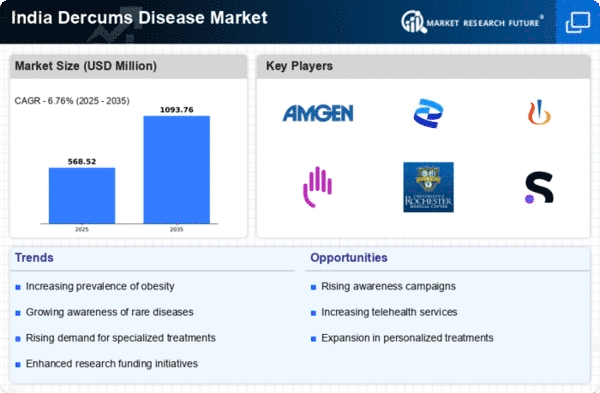Government Initiatives and Support
Government initiatives aimed at improving healthcare access and funding for rare diseases are pivotal for the dercums disease market. In India, the government has been actively promoting awareness and research into rare diseases through various programs and policies. For instance, the National Policy for Rare Diseases encourages the development of treatment protocols and financial support for patients. Such initiatives not only enhance the visibility of Dercums disease but also facilitate access to necessary treatments and care. The allocation of funds for research and development in rare diseases is expected to increase, potentially leading to breakthroughs in treatment options. This supportive environment is likely to attract pharmaceutical companies and researchers to invest in the dercums disease market, ultimately benefiting patients and healthcare providers alike.
Increasing Prevalence of Dercums Disease
The rising incidence of Dercums disease in India is a crucial driver for the dercums disease market. Recent studies indicate that the prevalence of this rare condition is gradually increasing, with estimates suggesting that approximately 1 in 100,000 individuals may be affected. This growing patient population necessitates enhanced healthcare services and treatment options, thereby expanding the market. As awareness of the disease spreads among healthcare professionals and the general public, more individuals are likely to seek diagnosis and treatment, further propelling market growth. The increasing prevalence also highlights the need for specialized medical research and development, which could lead to innovative therapies and management strategies within the dercums disease market. Consequently, stakeholders in the healthcare sector are likely to invest more resources into addressing this condition, fostering a more robust market environment.
Technological Advancements in Diagnostics
Technological advancements in diagnostic tools and methodologies are significantly influencing the dercums disease market. Innovations such as genetic testing and advanced imaging techniques are enabling earlier and more accurate diagnosis of Dercums disease. These advancements are crucial, as timely diagnosis can lead to better management of the condition and improved patient outcomes. The integration of artificial intelligence and machine learning in diagnostic processes is also emerging, potentially streamlining the identification of rare diseases. As diagnostic capabilities improve, healthcare providers are likely to see an increase in the number of diagnosed cases, which could drive demand for treatment options and services within the dercums disease market. This trend suggests a growing need for healthcare professionals to stay updated on the latest diagnostic technologies to effectively address patient needs.
Rising Investment in Rare Disease Research
The increasing investment in research and development for rare diseases is a significant driver for the dercums disease market. In India, both public and private sectors are recognizing the importance of addressing rare conditions, leading to a surge in funding for research initiatives. This investment is likely to foster collaborations between academic institutions, pharmaceutical companies, and healthcare organizations, aimed at discovering new treatment modalities for Dercums disease. Furthermore, the establishment of research grants and incentives for rare disease studies is expected to attract more researchers to this field. As a result, the dercums disease market may witness a rise in innovative therapies and clinical trials, ultimately enhancing treatment options available to patients. This focus on research not only benefits those affected by Dercums disease but also contributes to the overall advancement of medical science.
Growing Patient Advocacy and Support Groups
The emergence of patient advocacy and support groups is playing a vital role in shaping the dercums disease market. In India, these organizations are dedicated to raising awareness about Dercums disease, providing resources for patients and families, and advocating for better healthcare policies. By fostering a community of support, these groups empower patients to seek appropriate medical care and participate in clinical trials. Their efforts in educating the public and healthcare professionals about the disease are likely to lead to increased diagnosis rates and demand for treatment options. Additionally, patient advocacy groups often collaborate with pharmaceutical companies and researchers to influence the development of new therapies. This collaborative approach not only enhances the visibility of Dercums disease but also drives innovation within the dercums disease market, ultimately benefiting patients and healthcare providers.
















